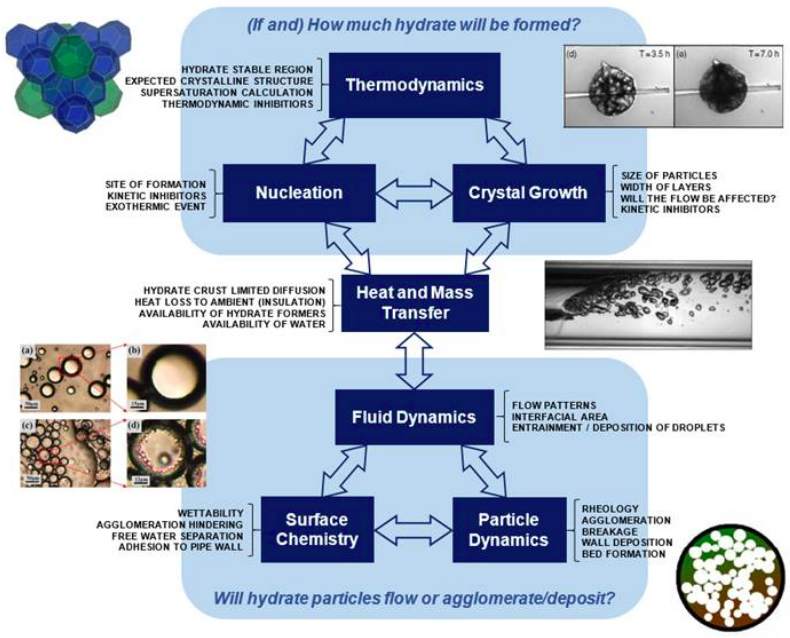Hydrate management

Gas hydrates are ice-like structures that usually form at low-temperature and high-pressure conditions where a small hydrocarbon molecule is trapped inside a cage of hydrogen-bonded water molecules. Their formation can be very harmful for the transport and production of hydrocarbons, because they can form obstructions that decrease the flow rates or even completely block the pipeline. The common practice in the industry has been to design the system to operate fully outside the hydrate stable region, what may imply in increased costs.

CAPEX savings will be a constant requirement in the coming years, due to uncertainties in oil prices and margins, as well as producing assets moving to harsher environments. In such scenarios hydrate management strategies can be an alternative to traditional hydrate avoidance methods.
One potential strategy for hydrate management involves allowing hydrates to form, while minimizing the risks of creating large deposits that agglomerate and adhere to the pipeline walls, which may severely restrict flow. In order to employ such a strategy, it is fundamental to understand the right conditions that allow hydrate particles to be transported safely within a multiphase slurry flow. These may involve various inter-related aspects of the fluids composition and chemical additives/inhibitors, the thermal and hydrodynamic aspects of the flow (including emulsion behavior) and, of course, the optimal operational conditions.
Publications:
Carneiro, J.N.E., Patil, A., Johansen, S.T., Gonçalves, G.F.N., Gallassi, M.P., 2018. Drop breakup and size evolution in oil and gas production: a review of models and mechanisms. In: Applications Paradigms of Droplet and Spray Transport (edited by Basu, S., Agarwal, A., Mukhopadhyay, A., Patel, C.): 83-121, Springer, Singapore.
Fossen, M., Johnsen, H., Kilaas, L., Schmueli, A., 2017. Evaluation of gas hydrates operation zone to establish an optimal hydrate management strategy. In: Offshore Technology Conference, Rio de Janeiro, Brazil, 24-26 October.
Schmueli, A., Schümann, H., Unander, T.E., 2017. Oil-water pipe flow dispersions – from traditional flow loops to real industrial transport conditions. In: Offshore Technology Conference, Rio de Janeiro, Brazil, 24-26 October.
Johansen, S.T., Mo, S., Meese, E., Oliveira, J.E.S., Reyes, J.F.R., Carneiro, J.N.E., 2015. CFD simulations of multiphase flows containing large scale interfaces and dispersed phases with selected production technology applications. In: Offshore Technology Conference, Rio de Janeiro, Brazil, 27-29 October.
